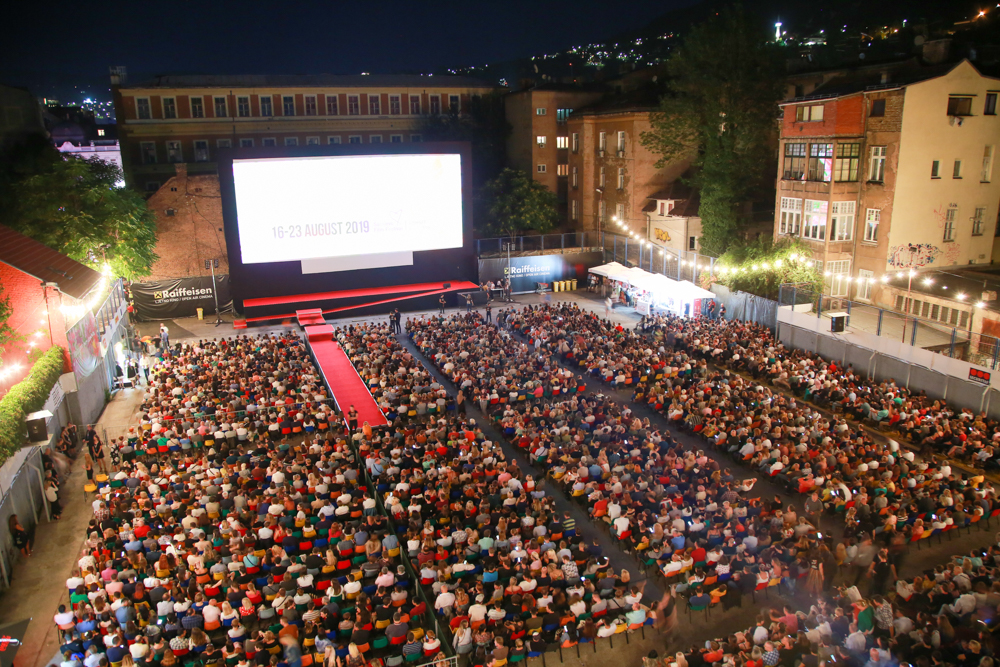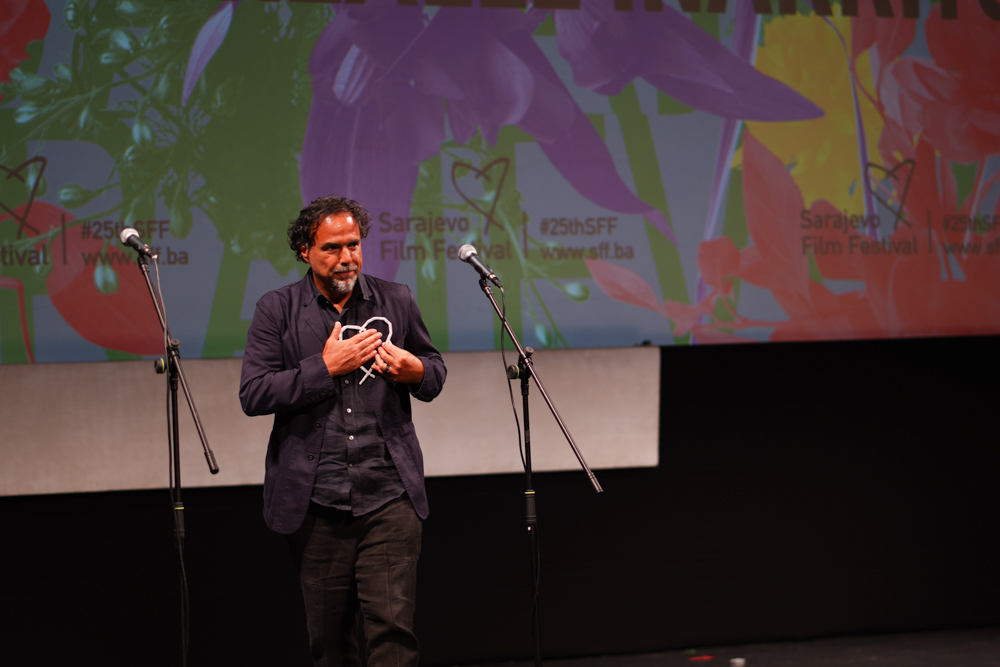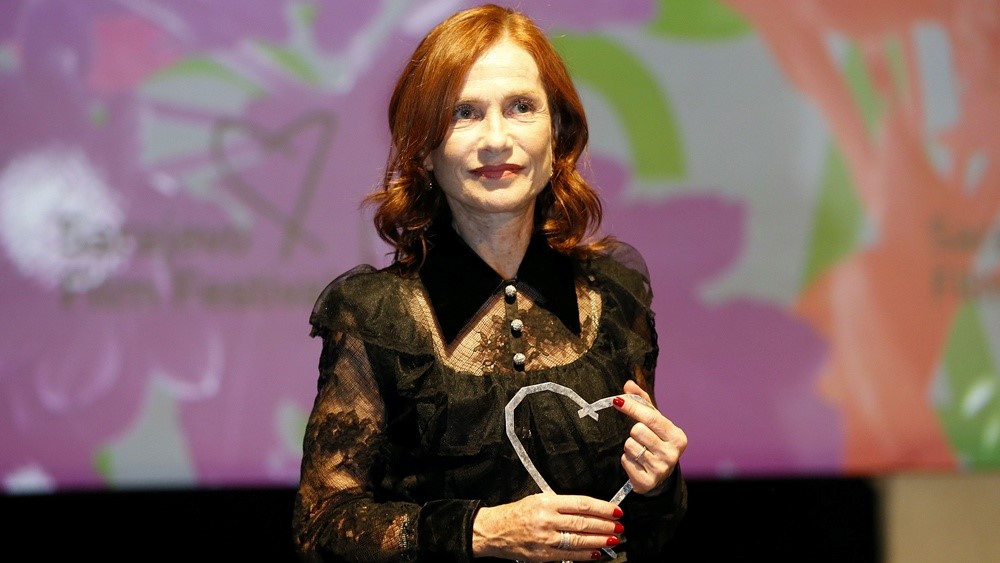Festivals 25th Sarajevo International Film Festival August 16 – 23, 2019
Sarajevo mon amour

This logo and the Sarajevo Hearts say it all. An impressive 25th celebration with great films and thousands of guests: film personas, journalists and cinephiles, mostly very young. This city is famous, not only in Bosnia-Herzegovina and in the Balkans, but in the world. In 1914, the assassination of Ferdinand and wife Sophia triggered WW I. in 1984, it hosted the 14th Olympic Games. In 1994, two years after the infamous conflict that dismantled what we knew as Yugoslavia, Sarajevo-Phoenix rises up from its ashes and starts a new life with 440.000 inhabitants today. Four years ago, I failed to earn an accreditation to attend the festival, but, this year I was warmly invited! A coincidence of 4’s?
The trip from Thessaloniki to Sarajevo is harsh! Flights, always through Belgrade, Zagreb or other European capitals, are expensive and yet with some transit delays. Bus-train combination is a less expensive option, but with some transfer discomfort. Determined to attend the 25th festival anyway, I took the all-night sleeper train to Beograd - 16hrs, with delays at 3 borders and an engine failure in Skopje – and eight hours bus to Sarajevo, altogether 25 hrs! But, I still managed to see two films that night! The welcome was very cordial and the information dissemination prior and during the festival was meticulously handled by well informed staff and volunteers; all very well-versed in English with ever-presence of Andriana ! A rewarding experience.
The program, with Mr. Mirsad Purivatra as president of the festival, had everything : Competition for feature films, shorts and documentaries, Human rights, Student Program, Kino scope, Tributes, Special Screenings, Dealing with the Past, Summer Screen, Master classes, Honorary Awards, Open Air screenings (3.000-seats), Premiers, Industry Meetings and Art Exhibits. Its basic idea was the focused on the South East European cinema – Greece, Turkey, Albania, Azerbaijan, etc - along with regional and international cinema.
Juries: Twenty two celebrated directors, producers, screen writers actors, famous film critics and actors made up various juries, with Ruben Ostlung from Sweden as president.
Awards and Sarajevo Hearts:
1. Sherbet, a Student film by director Nikola Stojanovic (Serbia). Aggressive behavior hiding fears test the struggle for communication.
2. Last trip to the Seaside, Short film by director Adi Voicu (Romania). A road movie for six youths travelling to a seaside brought out their inner inhibitions.
3. Last Image of Father, Special Mention Best Short film by Stefan Dordevic (Serbia-Croatia-Greece). Also another type of ‘road movie’; a Beograd father, Dusan, seeks a safe place for his son Laza.
4. Stack of Material, Special Mention Documentary, by Saira Subasic (Bosnia-Herzegovina).
A young lady’s attempt to ‘re-construct the ‘home’ of her parents, as well as the ‘city’.
5. Human Rights Award to The Euphoria of Being, by Reka Slabo (Hungary). Concentration camp survivror, out of 49 members of her family, Eva Fahidi, participates in a smashing theatrical dance performance today, at her 93years! Unbelievable message for endurance and thirst of life. The audience gave her a long applause and a standing ovation.
6. When the Perimonts Grew, Best Documentary by Hilal Baydarov (Azerbaijan). An in-depth conversation between a mother and her son recounting life revealed hidden secrets.
7. Heidi, Best Feature Film Award. By Catalin Mitulescu. A Bucharest police officer undertakes the search of two prostitutes involved in organized criminal.
8. Best Actor Award went to Lavan Gelbakhiani, in the film And then We Danced (Georgia- Sweden-France)by director Levan Akin – also rewarded in Cannes and Odessa FF and has been screened in 30 countries already. Breathtaking performance of the young dancer protagonist who struggles to perfection when his affection for a rival dancer changes his life. Homosexuality and homophobia in modern societies are delicate themes to touch with sincerity.
9. Best Actress Award received Irini Jabonas for her convincing role as a cop in the ‘Rounds’ by Stefan Komandarev (Bulgaria-Serbia). Three different patrolling crews in Sofia deal with human trafficking, social concern and political corruption. All, in one night, that happened to be the fall of the Berlin Wall! Bulgaria in transition, without allegories. The graveyard ‘scrabble’ by petty thieves was most hilarious.
10. Tale of Three Sisters (Turkey-Germany-Netherlands-Greece) by Emin Alper. Awarded also in Istanbul and Sofia. A sweet-and-sour atmosphere for the three girls exposed to two different environments
11. Take Me Somewhere Nice, by Ena Sendijarevic (Bosvia-Herzegovina-Netherlands). Best Feature Award. Another road movie: A Bosnian teenage girl living in Holland tries to visit her dying father in a Bosnian hospital. Her life-style clashes with that of her ruthless cousin and his friend. Alma (=soul), constantly determined to reach hospital, ignoring obstacles, while the three of them engage in love acts. In the discussion with some people in the audience I sensed an ambiguity regarding the message. But, a sturdy film.
 The 25th Festival Honorary Hearts of Sarajevo Awards for the outstanding contribution to cinema art, were given to:
The 25th Festival Honorary Hearts of Sarajevo Awards for the outstanding contribution to cinema art, were given to:
1. Actress Isabelle Huppert. Her collaborations with Claude Chabrol, Jean-Luc Godard and Michael Haneke, to mention a few, are landmarks.
2. Alejandro Gonsalvez Inarritu, Mexican director/producer/screenwriter and winner of two Oscars. Special screening of his film Birdman, was in the program. (Personally, I prefer Amores Perros and Revenant).
3.Director Pawel Pawlikowski. Nine of his films were screening, in retrospect. Cold War (latest, 2018) and Ida, both awarded in most of the festivals (Istanbul, Sofia, Kluj, Greece). The Serbian Epics (1992) and the Summer of Love (2004) are my favorites.
The Serbian Epics (1992) and the Summer of Love (2004) are my favorites.
The theaters for the master classes with Inarritu and P. Pawlikowski were absolutely packed; many people sat down in the aisles. And so was the Q&A session after the film SYNONIMS, with popular Nadav Lapid, winner of the Golden Bear at Berlinale 2019.The four open-air screenings with 2000 seats were also fully packed.
Other events: - School children were invited to attended pertinent programs. - The photographic exhibit by Brigitte Lacomb drew a lot of visitors. - A special evening for the Greek Cinema Center offered an opportunity for visitors to talk with Greek producers and film makers.
Some of the films I saw: 1) Stiches, by Miroslav Terzic (Serbia-Slovenia-Croatia-Bosnia-Herzegovina). Obsessed with the truth about the death of her new-born son, seamstress Ana confronts police and hospital staff. A very common story, but it touched me sentimentally as my sister had the same experience. Actress Snezana Bogdanovic was superb in a convincing role prepared meticulously by Miroslav.
2) A Cat in the Wall, by Vesela Kazakova and Mina Mileva (Bulgaria-U.K-France). In their first feature film, after a number of excellent documentaries, the directors depict many aspects of Britain (London) today through the clever use of a cat trapped in the wall: asphyxiated poor home owners, refugees and other marginal citizens facing system hostility Irina’s acting was stupefying.
3. Mo, by Rado Dragomir (Romania). In the verge of a thriller, two college students, after being caught cheating, end up in the professor’s apartment. Rock music reminds Mo’s father and she is driven to bed. A hymn to companionship for the two girls. The press screening with Rado was an apocalypse.
4. Whistlers, by Korneliu Porumbolu (Romania-France-Germany). A policeman plays double role with mafia - whistle is the ‘signal and practice‘ of informing.
5. Belonging, by Burak Cevik (Turkey-France-Canada). Awarded in Kluj film festival, is an intense story of an attempted murder following a wish.
6. Factory Sarajevo Mon Amour, very interesting works by a group of 10 directors (Bosnia-Herzegovina-Montenegro-Serbia-Slovenia-N.Macedonia-France) presenting 5 short films and one feature film.
7. It Must Be Heaven, by Elia Suleiman (France-Qatar-Germany-Canada-Turkey-Palestine). Many subtle political messages in this clever and funny road movie of a Palestine man travelling from Paris to N.Y City, carrying Palestine in his heart and mind. Suleiman was adored in the Q&A time.
8. Synonyms, by celebrated director Navad Lapid (France-Israel-Germany). An Israeli man moves to Paris denouncing his nationality and language. With the use of a dictionary he hopes to become French.
9. In Fabric, by Peter Strickland (U.K.). A search for a dark-red dress for a pending date creates a nightmare for Sheila.
10. Everything Must Fall, by Rehard Desai (S.Africa-Netherlands-Belgium). In-depth analysis of the South African student movement defending low-cost education, revealed the leadership problems in administering activist uprisings. Conflicting views brought large scale police intervention in the campus with detrimental consequences.
11. The Son, by Ines Tanovic (Bosnia-Herzegovina-Croatia-Romania-Slovenia-Montenegro). An adopted son becomes very aggressive when a new member arrives in the family.
12. When Tomatoes met Wagner, by Marina Economou (Greece). A surreal documentary about the persisting effort of unemployed village people to combat financial crisis in Greece.
Co-operation brings fruit as local tomatoes are exported. An encouraging message today.
14. The Miracle of Sargasso Sea, by a talented young director Syllas Tzoumerkas (Greece). The environment of a fishery brings together two women, in search of their identity. Awarded in Kluj and Sofia festivals.
15. The Golden Girl, by Denisa Morariu-Tamas (Romania). The fifteen-year struggle of an Olympic Gold Medal winner (2000, Sydney) to reposses her medal that taken after a doping test administered to her, without her knowledge in the 2000 Olympics.
16. Sarajevo 3 Letters, documentary by Goran Bregovic (Bosnia-Herzegovina-Serbia-France). An optimistic Message for co-existence, not only for Sarajevo but for the whole world after the experience of the 1992 war that tore apart Yugoslavia, mainly on religious and cultural pretext. Christianity, Judaism and Islam, the Tree Letters, are the core theme of the concerts around the world, from Paris to New York, Jerusalem, Marocco. The concert in Sarajevo was on August 24, was programmed for the day guests leaving the festival.
It appears that the themes in most of films focus on the need for identity, companionship, belonging, reaching-out to others, recognition or a mixture. Some other, depict efforts to raise awareness, to cope or fight corrupt society practices (mafia and modern human slavery), etc.
Films, like theater plays and good books, do not change life or overturn every day misery, but they leave a tiny imprint, and hope to encourage others to continue.
Sarajevo City. A jewel in itself. Amazing number of clean and well-trimmed parks, almost one in every block, and so many art galleries. I wonder if the vivid evening strolls along the Branilaca Sarajeva are the same in the winter. The charming old town with narrow streets, Bascarsija, reminiscent of Ottoman times, the frequent tram fleet and the leisure strolling along the river Miljacka with its 20 bridges are a treat. Climbing to the upper part of the city give the visitor a better view of the city, but the cable car trip is a breath taking. The local people are friendly; even when they did not speak English, they went out of their way to help with a smile. I have been in many film festivals, more than once, but Sarajevo has a mysterious positive energy I felt only in Santorini, Lisbon, Granada and Iceland. I have been to most of the Balkan festivals, more than once, but this festival has a kind of positive energy that is hard to describe.
Kiriakos Peftitselis



